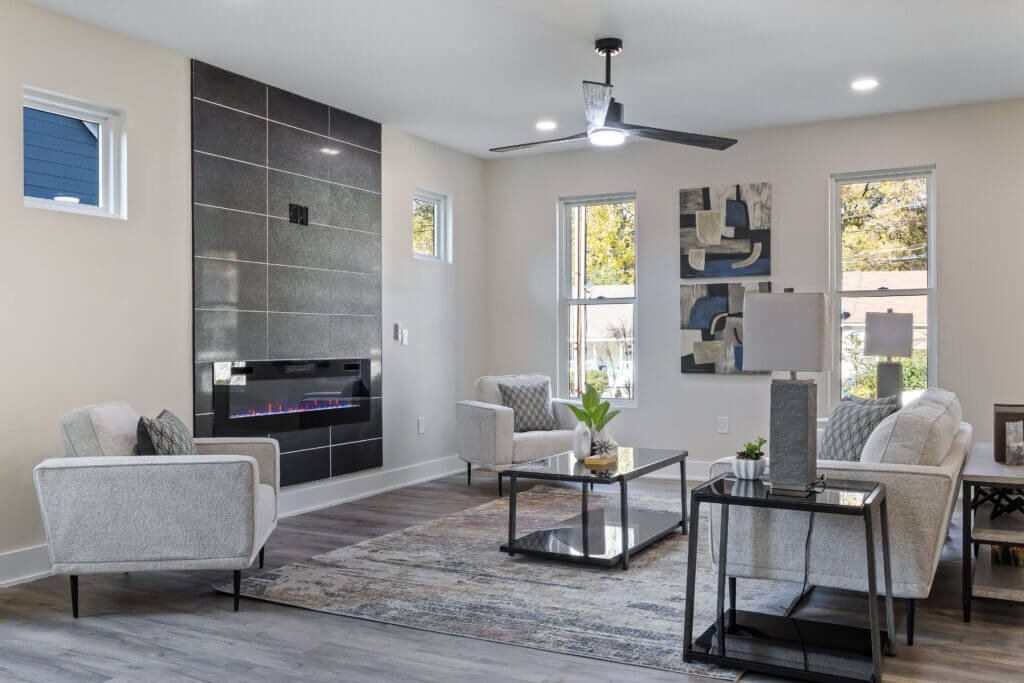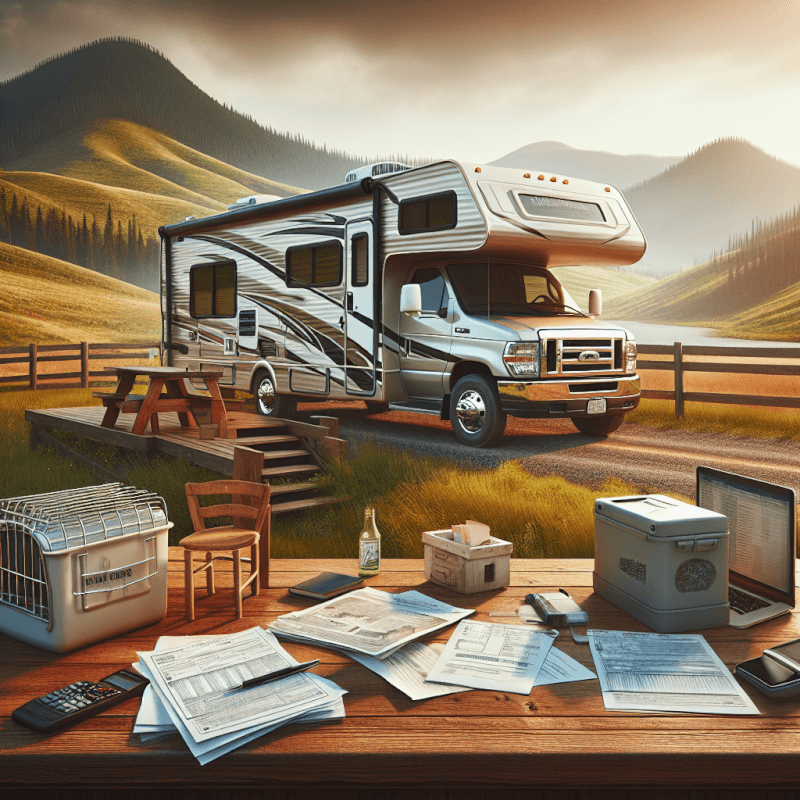Living in an RV full-time has become an increasingly popular lifestyle choice for many adventure enthusiasts. However, one common question that often arises is how to establish a legal residence while embracing the mobile lifestyle. Whether you’re a digital nomad or simply seeking a change of scenery, this article will guide you through the essential steps to ensure you have a legal address on the road. From choosing the right state to understanding residency requirements, we’ve got you covered on your journey towards establishing a secure and legal home base in your RV.
Choosing a Residency State
Considerations for choosing a residency state
Choosing a residency state is an important decision for full-time RVers. There are several considerations to keep in mind that will help you find the best fit for your lifestyle. Think about factors such as climate, cost of living, proximity to family and friends, recreational activities, and access to necessary services. Make a list of your priorities and weigh the options before making a decision.
Researching residency requirements
Once you have identified a few states that seem appealing, it is crucial to research their residency requirements. Each state has different rules and regulations regarding residency, and understanding them will help you make an informed decision. Look into factors such as minimum stay durations, documentation needed to establish residency, and any specific requirements for full-time RVers. Consider consulting official state websites or seeking legal advice to ensure you have accurate and up-to-date information.
Factors to consider when selecting a residency state
When selecting a residency state, there are a few additional factors to consider. One important consideration is the state’s tax implications. Some states have low or no income tax, which may be advantageous for full-time RVers. Another factor to think about is healthcare accessibility. Different states have varying levels of medical facilities and healthcare options, so consider your healthcare needs and preferences. Additionally, think about the local community and social connections available in each state. Joining RV clubs and online communities or participating in local events can enhance your full-time RVing experience.
Mail and Domicile
Using mail forwarding services
As a full-time RVer, managing your mail can be challenging. One option is to use mail forwarding services. These services allow you to establish a permanent mailing address, which is especially useful for receiving important documents and packages. Look for reliable and trustworthy mail forwarding services that offer personalized options and can forward mail to wherever you are traveling.
Renting or purchasing a mailbox
Another option for managing your mail is renting or purchasing a mailbox in a town or city that you visit frequently. This can provide you with a physical address to receive mail and packages. Consider choosing a mailbox service that offers secure storage and mail forwarding options. This way, you can have a consistent mailing address while still maintaining the freedom to travel.
Establishing domicile for legal purposes
Establishing domicile is crucial for full-time RVers as it determines your legal residence for various purposes, such as taxes and voting. Domicile is typically established by proving a physical presence in a state and intent to make it your permanent home. Some ways to establish domicile include obtaining a driver’s license, registering to vote, and maintaining a physical address. Consult the specific requirements of your chosen residency state to ensure you fulfill all necessary criteria.

Driver’s License and Vehicle Registration
Obtaining a driver’s license in your chosen state
One of the first steps to establishing residency in a state is obtaining a driver’s license. Each state has its own requirements for obtaining a driver’s license, so be sure to research the specific procedures for your chosen state. Typically, you will need to provide proof of residency, such as a utility bill or bank statement, as well as your current driver’s license and social security number. Once you have obtained your new driver’s license, you can use it as a primary proof of residency.
Registering your RV and other vehicles
Registering your RV and other vehicles is an essential part of establishing residency in your chosen state. Research the vehicle registration requirements for your state, as they can vary. Generally, you will need to provide proof of ownership, proof of insurance, and payment for registration fees. Keep in mind that some states may also require safety inspections or emissions testing for certain vehicles. Stay up-to-date with registration renewals to maintain compliance with state laws.
Maintaining compliance with vehicle registration laws
Once you have registered your RV and other vehicles in your chosen state, it is important to stay in compliance with ongoing vehicle registration laws. Stay informed about any changes in registration requirements and renewal deadlines. Failure to comply can result in penalties or even the loss of your legal residency status. Keep track of registration expiration dates and make necessary arrangements to renew your registration on time.
Health Insurance and Medical Care
Options for health insurance coverage
As a full-time RVer, it is important to have adequate health insurance coverage. There are several options to consider, including private health insurance, employer-sponsored coverage, or coverage through government programs such as Medicare or Medicaid. Research the different options available in your chosen state and consider your specific healthcare needs and budget when making a decision. It is also worth exploring health insurance plans that offer nationwide coverage to ensure you are protected wherever you travel.
Choosing a healthcare provider
Selecting a healthcare provider is another crucial aspect of establishing your residency as a full-time RVer. Consider factors such as the provider’s location, their acceptance of your insurance plan, and their ability to meet your specific medical needs. Research the local healthcare facilities and professionals in your chosen state and consider seeking recommendations from fellow RVers or online communities. Establishing a relationship with a trusted healthcare provider will give you peace of mind when medical care is needed.
Understanding emergency and routine medical services
While traveling, it is important to know where to access emergency and routine medical services in your chosen state. Identify hospitals, urgent care centers, and pharmacies in the areas you plan to visit frequently. Familiarize yourself with their hours of operation and contact information. Additionally, consider carrying essential medical information, such as your allergies, medications, and emergency contacts, to ensure prompt and accurate care in case of an emergency.

Taxes and Residency
Understanding tax residency rules
Understanding tax residency rules is essential for full-time RVers. Each state has different rules regarding tax residency, and complying with these rules is important to avoid penalties or legal complications. Generally, tax residency is determined based on factors such as physical presence, intent to make a state your permanent home, and financial ties to the state. Familiarize yourself with your chosen state’s tax residency rules and consult with a tax professional if needed to ensure compliance.
State income tax considerations
State income tax considerations are an important part of choosing a residency state as a full-time RVer. Some states have no income tax, while others have varying tax rates and deductions. Research the income tax laws of your chosen state and consider how they will impact your finances. Keep in mind that certain states may require you to file a non-resident tax return if you earn income from other states while residing there.
Sales tax implications
Sales tax implications are another aspect to consider when selecting a residency state. Different states have different sales tax rates, and this can impact your daily expenses and budget. Consider the overall cost of living in your chosen state, including sales tax on groceries, fuel, and other goods and services. Keep track of your sales tax obligations and plan your budget accordingly.
Voting and Political Participation
Registering to vote
As a citizen, exercising your right to vote is an important form of civic participation. To participate in local and national elections, you must register to vote in your chosen residency state. Research the voter registration process for your state, which typically involves providing proof of residency and completing a voter registration form. Stay informed about registration deadlines and stay engaged with the political process to have your voice heard.
Participating in local and national elections
Once you are registered to vote in your chosen residency state, take the opportunity to participate in local and national elections. Educate yourself about the candidates and issues on the ballot, attend debates or town hall meetings, and cast your vote on election day. Participating in elections allows you to have a say in policies and decisions that affect your community and the country as a whole.
Advocating for RVers’ rights
As a full-time RVer, you may encounter unique challenges or concerns that require advocacy. Joining RV clubs and online communities can provide you with a platform to connect with fellow RVers and advocate for your rights and interests. Stay informed about legislative and regulatory developments that affect the RVing community and get involved in lobbying efforts or grassroots initiatives. By working together, RVers can ensure their voices are heard and their needs are addressed.

Banking and Financial Matters
Opening a bank account in your chosen state
Opening a bank account in your chosen residency state is essential for managing your finances as a full-time RVer. Research local banks or credit unions that cater to full-time RVers and offer services that meet your needs. Look for features such as online banking, mobile check deposit, and fee-free ATM access to make banking on the road convenient and cost-effective. Gather the required documentation, such as proof of residency and identification, to open your account.
Managing finances on the road
Managing your finances while living in an RV full-time requires careful planning and organization. Set up a budget to track your income and expenses, taking into account factors such as campground fees, fuel costs, and maintenance expenses. Consider using online tools or budgeting apps to help you stay on top of your finances. Additionally, think about setting up automatic bill payments or utilizing online banking services for easy and timely financial management.
Choosing a financial institution that caters to full-time RVers
Choosing a financial institution that caters to full-time RVers can make your banking experience smoother and more convenient. Look for banks or credit unions that understand the unique needs of full-time RVers, such as the ability to receive mail and handle remote transactions. Consider researching reviews and recommendations from other RVers to find a financial institution that offers the services and support you require while on the road.
Legal Address and Physical Presence
Maintaining a legal address
Maintaining a legal address is essential for full-time RVers, as it serves as your permanent residence for various legal purposes. This can be a physical address, such as that of a family member or friend, or a mail forwarding service address. Ensure that your legal address is not just a P.O. Box or a temporary location, as it may impact your ability to establish residency and fulfill certain obligations.
Proving physical presence in your residency state
Proving physical presence in your residency state is a key step in establishing and maintaining your legal residency. Keep a record of your time spent in your chosen state, including campground receipts, utility bills, and any other documents that demonstrate your presence. It is important to show that you spend a significant amount of time in your residency state to avoid any challenges to your legal residency status.
Navigating legal and administrative challenges
Navigating legal and administrative challenges is a part of establishing and maintaining residency as a full-time RVer. From renewing vehicle registrations to handling legal documents, it is important to stay organized and informed. Keep track of deadlines for registrations, renewals, and other obligations. Seek professional advice if you encounter any legal or administrative challenges that you are unsure how to handle. By staying proactive and prepared, you can navigate these challenges with ease.

Establishing a Legal Residency Checklist
Creating a comprehensive checklist for residency establishment
Creating a comprehensive checklist for residency establishment can help you stay organized and ensure you complete all necessary steps. Include items such as obtaining a driver’s license, registering to vote, and opening a bank account on your checklist. Break down each item into specific tasks and deadlines to help you stay on track. A comprehensive checklist will serve as a valuable resource throughout your journey as a full-time RVer.
Keeping track of important documents and deadlines
Keeping track of important documents and deadlines is vital for establishing and maintaining your legal residency. Create a system to organize your documents, such as a file folder or a portable scanner, to ensure you have everything you need readily available. Set reminders for renewal deadlines for vehicle registrations, driver’s licenses, and other time-sensitive obligations. By staying organized, you can avoid unnecessary stress and maintain compliance with legal requirements.
Seeking professional advice if needed
Establishing a legal residency while living in an RV full-time can be complex, and seeking professional advice when needed is a wise decision. If you have questions or concerns about any aspect of establishing residency, consult with a lawyer or a tax professional who specializes in RVers’ legal matters. They can provide guidance tailored to your specific situation and ensure you are making informed decisions that align with your goals and legal obligations.
Community and Social Connections
Connecting with other full-time RVers
Connecting with other full-time RVers can provide invaluable support and camaraderie throughout your journey. Seek out RV clubs or organizations that cater to full-time RVers and join their events and gatherings. Online communities and forums are also great places to connect with like-minded individuals and share experiences and advice. Building a network of fellow RVers can enrich your travel experiences and create lasting friendships.
Joining RV clubs and online communities
Joining RV clubs and online communities is a fantastic way to tap into a wealth of knowledge and resources. Many RV clubs offer benefits such as exclusive discounts, educational resources, and access to community events. Online communities provide a platform for interaction, where you can ask questions, seek recommendations, and share your own experiences. Participating in these clubs and communities not only helps you connect with others but also allows you to stay up to date with the latest RVing trends and news.
Participating in local events and gatherings
Participating in local events and gatherings in your chosen state can enhance your sense of community and connection. Look for events that align with your interests, such as RV rallies, festivals, or volunteer opportunities. Engaging with the local community allows you to immerse yourself in the culture and forge meaningful connections with residents. Consider attending local events and gatherings whenever possible to create memorable experiences and broaden your social circle.
In conclusion, establishing a legal residence while living in an RV full-time requires careful consideration and planning. By researching residency requirements, managing mail and domicile, obtaining driver’s licenses and vehicle registrations, securing health insurance and medical care, understanding tax implications, participating in voting and political activities, managing banking and financial matters, maintaining a legal address and physical presence, and creating a comprehensive checklist, you can successfully establish a legal residency that suits your unique needs as a full-time RVer. Additionally, fostering community and social connections with other RVers and participating in local events will enhance your overall RVing experience. Remember to seek professional advice when needed and stay organized throughout the process. With proper preparation and attention to detail, you can navigate the legal and administrative aspects of full-time RVing with ease and enjoy the freedom and adventure that comes with this lifestyle.



